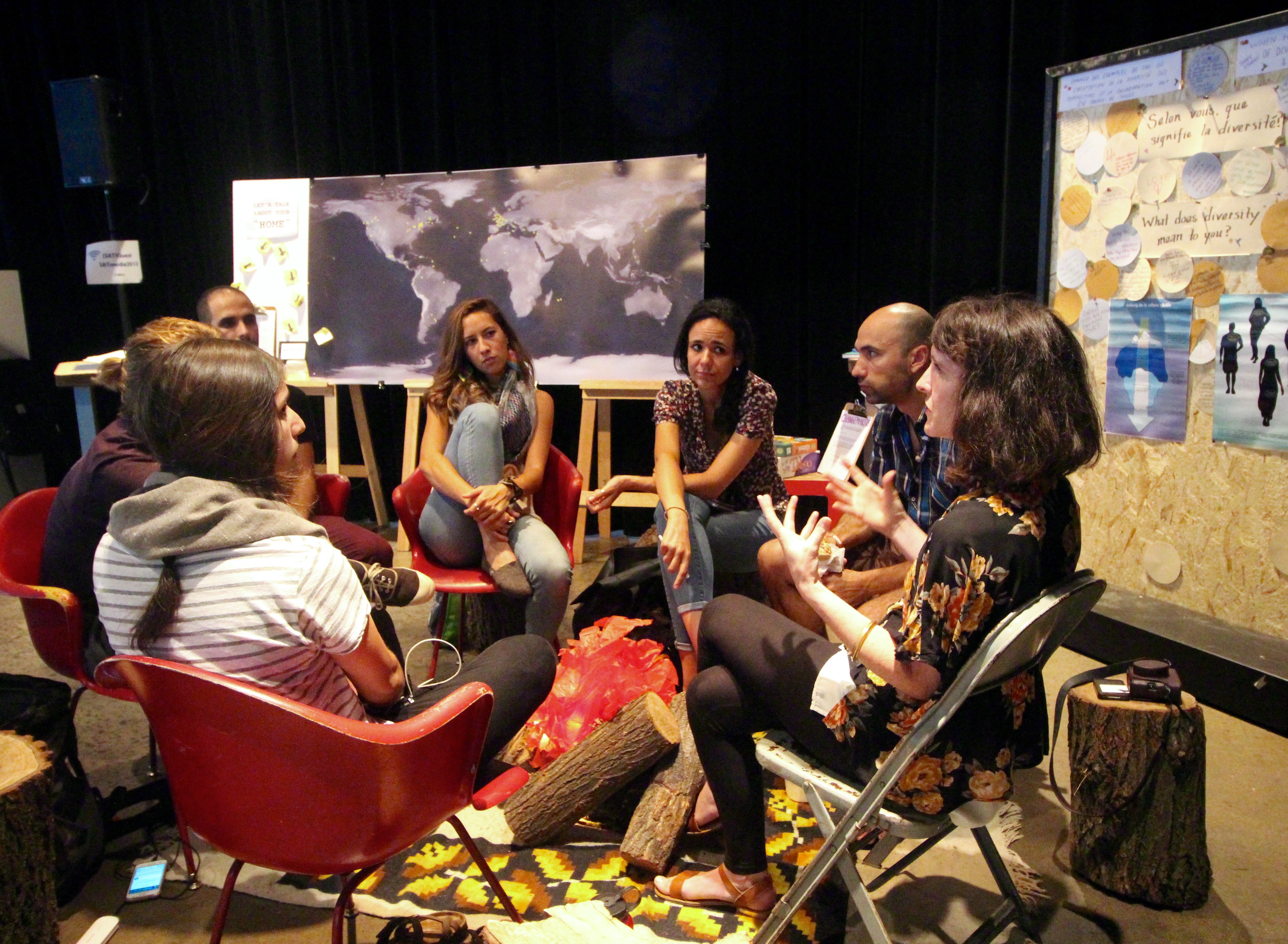Friday was the last day of our PlacetoB conversation circle and we started the conversation by asking about examples of cross-cultural collaboration witnessed during the World Social Forum.
Flavie, a free-lance journalist from France, has lived and worked in various countries. She presented an exhibit focused on her project with Refugee Economics. She spoke about one of the workshops she attended, where someone brought up the issue of “the rise of rape and violence in Sweden, in correlation to the influx of refugees in certain areas.”
Flavie used this example to discuss the complexity of the issues we attempt to address at events such as the World Social Forum. Taken at face value, this example about cross-cultural conflict could induce more fear and feed stereotypes and prejudices against people and problems we don’t fully understand. In this case, the finger would be pointed at refugees and their countries and cultures of origin, with little introspection of some of the wider issues at play.
Flavie shared how a woman in the audience does intervention work in schools in Hungary, working specifically with Roma refugees. The woman spoke about how a staggering number of Roma people do not get accepted as refugees and how this issue has prevented a sense of belonging and community.
The participant worked in intercultural mediation, addressing problems specific to Roma children and the baggage they have no choice but to carry into their new lives. As a group, we spoke about how we often discuss or attempt to address issues at their surface value, without understanding the larger structural issues.
“We cannot talk about the problems we hear about or the statistics we see, without addressing their political, social and structural realities,” said one concerned participant.
We discussed how organizations try and deal with “migrant issues,” by finding temporary bandaid solutions. There is undoubtedly an “us and them” mentality, whenever communities come face first with one another and a lack of education is present.
“There needs to be community education prior, during and post migration, in order to bridge communities,” said another participant. There are structural and legal issues that have immediate impacts on the ways in which cultural divides are bridged, as well as racist attitudes that need to be addressed, on a grass-roots level.
For example, we need to look closely at immigration laws. In Canada, many people migrate because they are told they will be able to work. Once they arrive, they are overqualified and face a nearly impossible system of entering into the work force.
There are entire generations lost or sacrificed, in order to secure the future of their children. These are children who then carry the weight of this story and have to face their own cultural and social barriers. This divide keep communities marginalized and excluded from the dominant narrative.
A law has just been passed in Nice, France, banning the burkini from the beach. Consequently, muslim women who wear the full-length bathing suit are restricted from accessing what was once a public space for all.
As a group, we wondered: Are there connections between the anti-semitism we’ve witnessed unfold into a historical horror story and the Islamophobia which continues to rise today? What are our individual roles in all of this?
As politicians and government officials make moves, many concerned citizens remain in “observation mode,” as one participant named it.
“I believe that this subject has profound roots in things that we don’t want to talk about right now,” he said. “In the 1930s, some Europeans saw what was happening to the Jewish communities and they had something inside them that allowed them to continue to watch,” he said.
One of his uncles is one of the brightest and most intelligent people he knows. He remembers a family gathering very shortly after 9-11 when everyone in the room had a heated opinion. He remembers watching his respected uncle closely, as he said nothing at all.
But is the act of bearing witness somehow being apathetic in the face of injustice? Do we have social responsibilities to be informed and form opinions? To share, urge action and mobilize? Is it true that if you don’t speak up for the oppressed, you yourself become the oppressor?
We talked about how witnessing often leaves ones with the sensation of being powerless. Another participant said that he sometimes steps away from the news and social media, to protect his mental well-being.
“The easiest answer is to always have an answer and to place blame,” he said. “It’s always easier to run and blame the other.” Sometimes, it was just too much.
How do we find the balance of being informed and also remaining in a place of security and love?
Right now, one debilitating shadow of our selves and our societies seems to be the sensation of fear. In the media, we see violence and terror, we hear about building walls higher and keeping others out.
How do we combat this fear and return to a sense of security? How do we fight the powers that enforce segregation, in order to come together and connect? As a group of journalists, educators, artists and primarily active citizens, we agreed that we do have some type of responsibility.
Discussion is one step, and a necessary one, but we must find ways to act and react appropriately. With chronic distraction, mixed messages in the media and exclusive dominant narratives, we have a role to write our own stories and reclaim our power.
So that’s what we did. Here, in this moment today, we asked big questions and found more centralized solutions. The morale of the story was this: the conversation is not over.
If you are interested in joining in on conversations like the ones that took place at PlacetoB’s event during the World Social Forum, please contact: emileegilpin@gmail.com



